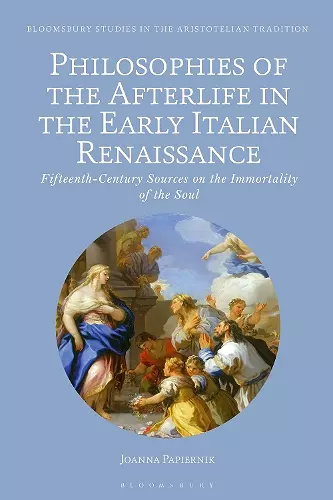Philosophies of the Afterlife in the Early Italian Renaissance
Fifteenth-Century Sources on the Immortality of the Soul
Assistant Professor Joanna Papiernik author
Format:Hardback
Publisher:Bloomsbury Publishing PLC
Published:18th Apr '24
Currently unavailable, and unfortunately no date known when it will be back

Joanna Papiernik explores the early development of the immortality debate in Renaissance philosophy through a close investigation of four key 15th-century Italian treatises.
The immortality of the soul is one of the oldest tropes in the history of philosophy and one that gained significant momentum in 16th-century Europe. But what came before Pietro Pomponazzi and his contemporaries? Through examination of four neglected but central figures, Joanna Papiernik uncovers the rich and varied nature of the afterlife debate in 15th-century Italy.
By engaging with old prints, manuscripts and other archival material, this book reveals just how much interest there was in the question of immortality before the 16th-century boom in Aristotelian translations. In particular, Papiernik sheds light on the treatises of Agostino Dati, Leonardo Nogarola, Antonio degli Agli and Giovanni Canali, all of which have until now been overlooked in modern scholarship. From Dati’s critiques of ancient and existing positions to Agli’s study of immortality and its relation to the metaphysics of light, this volume investigates not only how wide-ranging the debate was but also the important impact it had on later philosophical thinking.
Deftly combining close reading with a broad intellectual survey, and including two editions of unpublished primary texts, Philosophies of the Afterlife in the Early Italian Renaissance provides a crucial insight into the development of early Renaissance Platonism and philosophy of religion.
Deeply researched and filled with broad learning, this book should become part of the bookshelf of every scholar interested in the intellectual history of early modern Europe. Papiernik shows deftly that Italian thinkers of the fifteenth century explored the issue of the possible immortality of the human soul in original and lasting ways, often through seeing philosophy and religion as one unified enterprise. * Christopher S. Celenza, James B. Knapp Dean, Krieger School of Arts and Sciences, Johns Hopkins University, USA *
This work holds great value for enhancing our understanding of Renaissance culture. It delves into one of the most significant and challenging issues in the history of ideas, where philosophy, science, and religion intersect in a critical manner. The author engages with an impressive array of sources, both printed and unedited, all of which are consistently contextualized, interconnected, and interpreted accurately and innovatively * Daniel A. Di Liscia, Postdoctoral Fellow, Department of Philosophy, Munich Center for Mathematical Philosophy, Germany *
In Renaissance philosophy the immortality of the soul has been often too narrowly associated with the platonist Marsilio Ficino. Lesser-known but no less interesting authors from different traditions have written on this theme, in particular Antonio degli Agli, Leonardo Nogarola, Agostino Dati and Giovanni Canali. In this truly commendable book, Joanna Papiernik broadens our horizons, offering us a wealth of informations and texts on the afterlife of the spirit as a proof of the dignity of man. * Stéphane Toussaint, CNRS Research Director, Sorbonne Université, France *
ISBN: 9781350345836
Dimensions: 234mm x 155mm x 20mm
Weight: 560g
272 pages